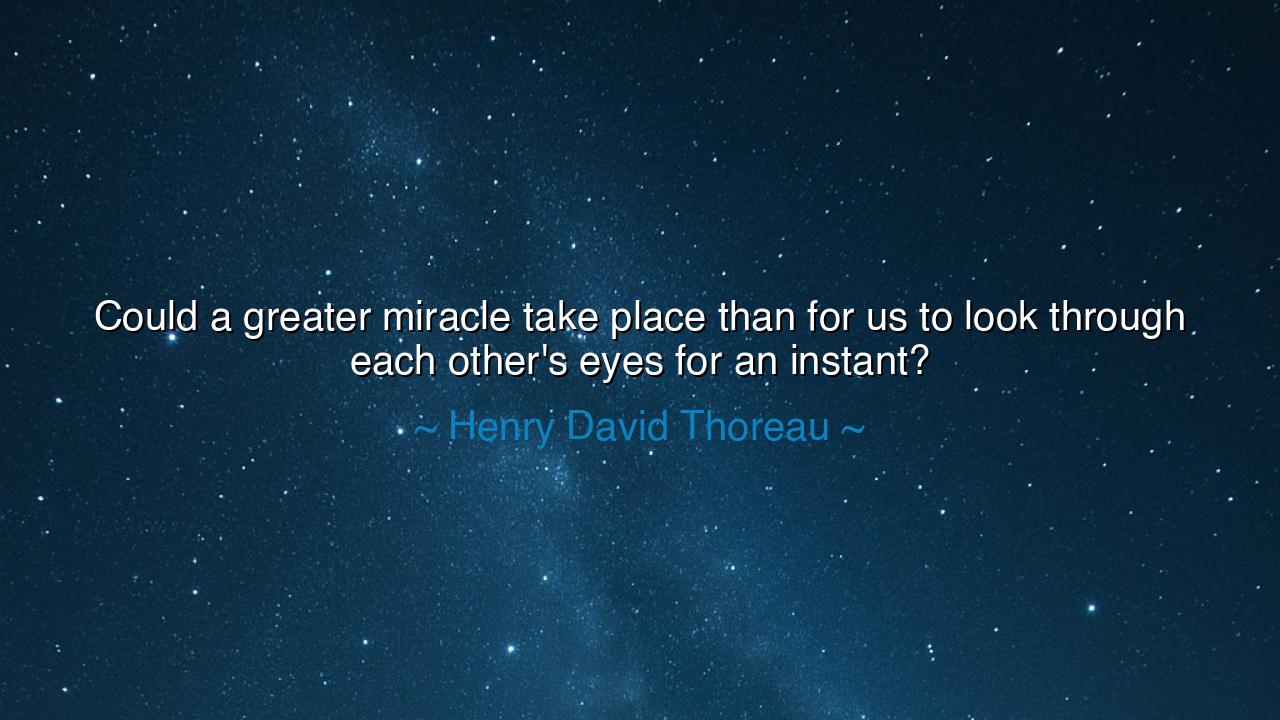
Could a greater miracle take place than for us to look through
Could a greater miracle take place than for us to look through each other's eyes for an instant?






"Could a greater miracle take place than for us to look through each other's eyes for an instant?" — Henry David Thoreau
In these luminous words, Henry David Thoreau, the sage of Walden Pond, reveals one of the highest longings of the human soul—the desire to truly understand one another. His question is not meant to be answered, for the answer is already within it: there is no miracle greater than empathy, no wonder more divine than the act of seeing the world as another sees it. To “look through each other’s eyes” is to transcend the walls of self, to step for a moment beyond our own desires, fears, and judgments, and to dwell within the sacred space of another’s heart. It is a miracle not of the heavens, but of the human spirit.
The origin of this quote lies within Thoreau’s writings in Walden, a meditation on simplicity, solitude, and the truth of human existence. In his quiet retreat among the pines and waters, he sought to strip life down to its essence. And in that solitude, he discovered a paradox—that while solitude brings wisdom, true understanding arises only through connection. Thoreau was a man of nature, yet his heart was deeply human; he knew that to live rightly, one must not only see the trees and stars, but also the souls beside us. Thus, he calls empathy the greatest miracle—for it bridges the infinite distance between two hearts.
To see through another’s eyes is not merely to agree or to sympathize—it is to experience the world as they do, even if only for a breath. Imagine, for a moment, the weight that would fall from the world if this miracle were common: the cruel would soften, the proud would bow, the bitter would forgive. Wars would cease before they began, for who could harm another if they could feel their pain? This is why Thoreau speaks of miracle, for such understanding, though simple in concept, is the rarest of acts. It demands humility—the letting go of self—and courage—the willingness to feel what may wound the heart.
History offers us glimpses of those who practiced this sacred art. Abraham Lincoln, during the darkest days of the American Civil War, bore a heart heavy with empathy. He once said, “I have not willingly planted a thorn in any man’s bosom.” Though surrounded by rage and vengeance, he refused to see his enemies as monsters, but as men—broken, confused, yet human still. That ability—to see through another’s eyes, even in conflict—made him not just a great leader, but a great soul. His mercy was born not of weakness, but of understanding. In him, Thoreau’s miracle lived.
And yet, this miracle is not beyond us. It dwells in every act of listening, every moment we pause before judging, every time we say, “Tell me how you feel.” It is present when a mother looks upon her child’s tears and feels them as her own, when a friend senses another’s unspoken sorrow, when even a stranger’s suffering stirs compassion in our chest. Each moment of true empathy is a spark of divine light. For to look through another’s eyes, even for an instant, is to glimpse the unity beneath all difference—the truth that we are not separate beings, but threads in the same eternal fabric.
But Thoreau’s words also carry a warning: that this miracle, though possible, is fragile. Pride, fear, and prejudice cloud our vision. We cling to our own perspectives as if they were truth itself, forgetting that the world looks different from every shore. To practice the miracle he describes, we must learn the art of stillness. We must quiet the noise within us long enough to hear another’s song. It is a discipline of the soul, as demanding as any pilgrimage, and as holy as prayer.
So, my child of the future, take this wisdom as a lamp for your journey: seek always to see through another’s eyes. When anger rises, pause and ask, “What would I feel if I were them?” When division stirs, look for the humanity hidden behind the difference. Speak less to be right, and more to understand. For as Henry David Thoreau teaches us, the greatest miracle is not found in the heavens, nor in riches, nor in conquest—it is found in the moment two hearts see each other clearly, if only for an instant. And in that fleeting vision, the walls of the world fall away, and all that remains is love.






AAdministratorAdministrator
Welcome, honored guests. Please leave a comment, we will respond soon